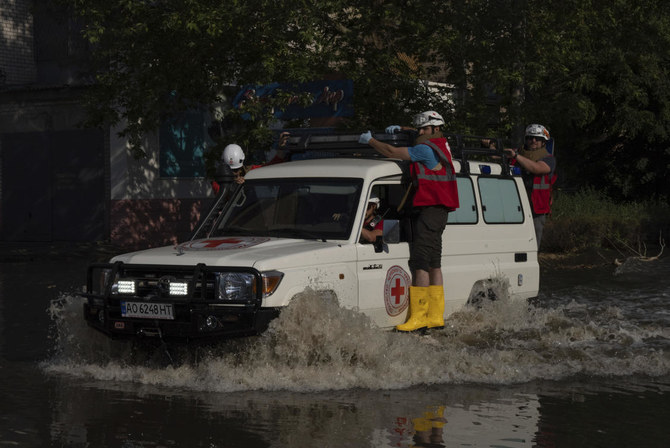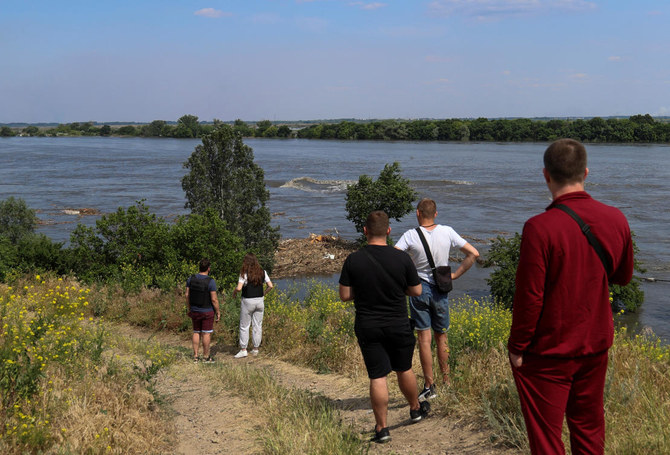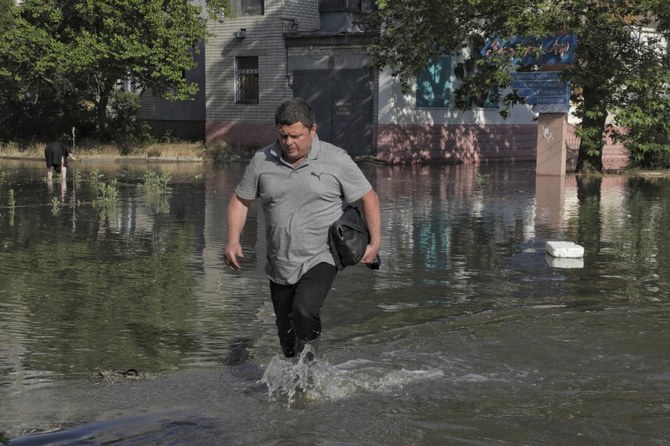KHERSON, Ukraine: An attack on a major Russian-held dam in southern Ukraine on Tuesday unleashed a torrent of water that flooded a small city and two dozen villages and forced the evacuation of 17,000 people, sparking fears of a humanitarian disaster.
Washington warned there would be “likely many deaths” as Moscow and Kyiv traded blame for ripping a gaping hole in the Kakhovka dam, which is located on the frontline and provides cooling water for Europe’s largest nuclear plant.
Kyiv said the destruction of the dam — seized by Russia in the early hours of the war — was an attempt by Moscow to hamper its long-awaited offensive, which Ukraine’s leader stressed would not be affected.
An emergency meeting of the UN Security Council was scheduled for 2000 GMT Tuesday following requests from Russia and Ukraine, diplomatic sources said.
People in Kherson, the largest population center nearby, headed for higher ground as water poured into the Dnipro River.
“There is shooting, now there is flooding,” said Lyudmyla, who had loaded a washing machine onto a cart attached to an old Soviet car.
“Everything is going to die here,” added Sergiy as water from the dam poured into the city which was the scene of heavy fighting in 2022.
Ukrainian authorities said 17,000 people were being evacuated and a total of 24 villages had been flooded.
“Over 40,000 people are in danger of being flooded,” Prosecutor General Andriy Kostin said, adding that 25,000 more people should be evacuated on the Russian-occupied side of the Dnipro River.
Vladimir Leontyev, the Moscow-installed mayor of Nova Kakhovka where the dam is located, said the city was underwater and hundreds of people had been evacuated.
Ukrainian President Volodymyr Zelensky accused Russia of blowing up the dam and said authorities expected up to 80 settlements to be flooded, urging the world to “react.”
“This crime carries enormous threats and will have dire consequences for people’s lives and the environment,” Zelensky told a Vatican peace envoy, Italian cardinal Matteo Zuppi, in Kyiv, the presidency said.
He later said in a Telegram message that the explosion “did not affect Ukraine’s ability to de-occupy its own territories.”
Kyiv also called for a meeting of the UN Security Council and warned of a potential “ecocide” after 150 tons of engine oil spilled into the river.
Western powers also blamed Russia for the damage, with EU chief Charles Michel calling it a “war crime,” while NATO chief Jens Stoltenberg said the dam breach was “outrageous“
The United States “cannot say conclusively what happened at this point,” National Security Council spokesman John Kirby told reporters.
Russia however said the dam was partially destroyed by “multiple strikes” coming from Ukrainian forces and urged the world to condemn Kyiv’s “criminal acts.”
Kremlin spokesman Dmitry Peskov said the destruction was the result of “deliberate sabotage by the Ukrainian side.”
The Soviet-era dam, built in the 1950s, sits on the Dnipro River, which provides cooling water for the Russian-occupied Zaporizhzhia nuclear power plant some 150 kilometers (90 miles) away.
Moscow and Kyiv offered conflicting versions on the safety of the facility.
The Russian-installed director of the plant, Yuri Chernichuk, echoed the UN agency and said that “at the moment, there is no security threat to the Zaporizhzhia nuclear power plant.”
“The water level in the cooling pond has not changed,” he said, adding that the situation was under control.
But Ukraine, which in 1986 suffered the devastating Chernobyl nuclear disaster, sounded the alarm.
“The world once again finds itself on the brink of a nuclear disaster, because the Zaporizhzhia nuclear power plant lost its source of cooling. And this danger is now growing rapidly,” Zelensky’s aide Mykhaylo Podolyak said.
The Ukrainian nuclear operator, Energoatom, said the water level of the Kakhovka reservoir was “rapidly decreasing, which is an additional threat to the temporarily occupied Zaporizhzhia nuclear power plant.”
The UN humanitarian agency said it was concerned about “the severe humanitarian impact on hundreds of thousands of people on both sides of the front line.”
“Flooding and fast-moving water can move mines and explosive ordnance to new areas which previously had been assessed as safe, thus putting more people in danger,” it added.
News of the damage came after Russia said Ukraine had begun a long-expected counter-offensive to claw back lost territory after Moscow invaded in February, 2022.
On Tuesday, Defense Minister Sergei Shoigu announced that Moscow had halted Kyiv’s offensive but lost 71 soldiers over the past three days, an extremely rare admission of Russia’s losses.
On Monday, Zelensky praised his troops for advances claimed near the devastated city of Bakhmut.
Kyiv already accused Moscow of mining the dam as combat raged nearby in October, during the last major offensive by Ukrainian forces seeking to regain lost territory. Russia denies the claim.
The Kakhovka dam has strategic value as it pumps water into the North Crimean Canal, which starts in southern Ukraine and crosses the entire Crimean peninsula.
Experts say that any problem with the dam could cause water supply problems for Crimea, which has been under Russian control since 2014.
Ukraine evacuates thousands after key dam destroyed
https://arab.news/475dz
Ukraine evacuates thousands after key dam destroyed

- Washington warned there would be "likely many deaths" as Moscow and Kyiv traded blame for ripping a gaping hole in the Kakhovka dam
- People in Kherson, the largest population centre nearby, headed for higher ground as water poured into the Dnipro River
Israel blocks food supply to northern Gaza’s Indonesian hospital to force out doctors

- Patients, doctors forced out from Kamal Adwan hospital are sheltering in Indonesia Hospital
- The facility has been sheltering critically ill patients with no electricity, water, UN says
JAKARTA: Israeli forces have blocked food and water supply to the Indonesia Hospital in northern Gaza to force out the doctors who are refusing to leave their patients behind, the nongovernmental organization that funded it said on Sunday.
The hospital in Beit Lahiya, a four-story building located near the Jabalia refugee camp, was built from donations organized by the Jakarta-based Medical Emergency Rescue Committee.
It has been sheltering more than a dozen patients, caregivers and health workers from Gaza’s Kamal Adwan hospital, which was destroyed in December after months of relentless Israeli attacks.
The remaining doctors are defying orders to leave the Indonesia Hospital, MER-C said, adding that they last received food aid from the UN Office for the Coordination of Humanitarian Affairs.
“They are still holding out. The condition is deteriorating, there’s a lack of water and food,” Marissa Noriti, a MER-C volunteer in Deir el-Balah in central Gaza, told Arab News via WhatsApp.
“The Israeli occupation forces are blocking supply … The doctors are staying for the patients. They refuse to leave them behind.”
Indonesia Hospital is no longer in service after it was severely damaged by frequent Israeli attacks since October 2023. But the facility was still sheltering critically ill patients, despite not having electricity, water or supplies, according to UNOCHA.
The hospital operated under limited capacity last year, but Israeli bombardments forced the patients and medical staff to transfer to the Al-Shifa hospital in southern Gaza last December, with only a few doctors staying behind.
On Friday, as the hospital was surrounded by Israeli forces attacking the area, the doctors were ordered to leave the facility and the patients.
“We are monitoring the situation. Israel’s occupation forces are cutting off all supplies to force them out; this is their strategy to empty north Gaza, to empty all the hospitals in the north so the people have no place to go to seek help,” Sarbini Abdul Murad, chairman of MER-C’s board of trustees in Jakarta, told Arab News.
“We ask that the international community act by any means to save Palestine from the crimes of the IDF (Israel Defense Forces).”
Israel has frequently targeted medical facilities in the Gaza Strip, saying that they are used by Palestinian armed groups. The attacks have pushed the enclave’s healthcare system to the brink of collapse.
Israel’s war on Gaza has killed more than 45,000 Palestinians and wounded over 108,000 since Oct. 7, 2023. The real death toll is believed to be much higher, with estimates published by medical journal The Lancet indicating that, as of July, it could be more than 186,000.
France’s ex-president Sarkozy on trial over alleged Qaddafi pact

- The career of Nicolas Sarkozy has been shadowed by legal troubles since he lost the 2012 presidential election
- Latest trial is the result of a decade of investigations into accusations that Sarkozy accepted illegal campaign financing
PARIS: Former French president Nicolas Sarkozy, already convicted twice in separate cases since leaving office, on Monday goes on trial charged with accepting illegal campaign financing in an alleged pact with the late Libyan dictator Muammar Qaddafi.
The career of Sarkozy has been shadowed by legal troubles since he lost the 2012 presidential election. But he remains an influential figure for many on the right and is also known to regularly meet President Emmanuel Macron.
The fiercely ambitious and energetic politician, 69, who is married to the model and singer Carla Bruni and while in power from 2007-2012 liked to be known as the “hyper-president,” has been convicted in two cases, charged in another and is being investigated in connection with two more.
Sarkozy will be in the dock at the Paris court barely half a month after France’s top appeals court on December 18 rejected his appeal against a one year prison sentence for influence peddling, which he is to serve by wearing an electronic bracelet rather than in jail.
The latest trial is the result of a decade of investigations into accusations that Sarkozy accepted illegal campaign financing — reportedly amounting to some 50 million euros — from Qaddafi to help his victorious 2007 election campaign.
In exchange, it is alleged, Sarkozy and senior figures pledged to help Qaddafi rehabilitate his international image after Tripoli was blamed for bombing attacks on Pan Am Flight 103 in 1988 over Lockerbie in Scotland and UTA Flight 772 in 1989 that killed hundreds of passengers.
Sarkozy has denounced the accusations as part of a conspiracy against him, insisting that he never received any financing for the campaign from Qaddafi and that there is no evidence of any such transfer.
At a time when many Western countries were courting Qaddafi for energy deals as the maverick dictator sought to emerge from decades of international isolation, the Libyan leader in December 2007 visited Paris, famously installing his tent in the center of the city.
But France then backed the UN-sanctioned military action that helped in 2011 oust Qaddafi, who was then killed by rebels. Sarkozy has said allegations from former members of Qaddafi’s inner circle over the alleged campaign financing are motivated by revenge.
If convicted, Sarkozy faces up to 10 years in prison under the charges of concealing embezzlement of public funds and illegal campaign financing. The trial is due to last until April 10.
Sarkozy “is awaiting these four months of hearings with determination. He will fight the artificial construction dreamed up by the prosecution. There was no Libyan financing of the campaign,” said his lawyer Christophe Ingrain.
Among 12 others facing trial over the alleged Libyan financing are heavyweights such as Sarkozy’s former right-hand man, Claude Gueant, his then-head of campaign financing, Eric Woerth, and former minister Brice Hortefeux.
“Claude Gueant will demonstrate that after more than ten years of investigation, none of the offenses he is accused of have been proven,” said his lawyer Philippe Bouchez El Ghozi, denouncing the cases as amounting to “assertions, hypotheses and other approximations.”
For the prosecution, the pact started in 2005 when Qaddafi and Sarkozy, then interior minister, met in Tripoli for a meeting ostensibly devoted to fighting illegal migration. But Sarkozy’s defense counters that no trace of the illegal financing was ever found in the campaign coffers.
The scandal erupted in April 2012, while Sarkozy was in the throes of his re-election campaign, when the Mediapart website published a bombshell article based on a document purportedly from December 2006 it said showed a former Libyan official evoking an agreement over the campaign financing.
Sarkozy has long contended that the document is not genuine.
An embittered Sarkozy would later narrowly lose the second round of the election to Socialist Francois Hollande.
Franco-Lebanese businessman Ziad Takieddine, a key figure in the case, had claimed several times that he helped deliver up to five million euros ($5.4 million at current rates) in cash from Qaddafi to Sarkozy and his chief of staff in 2006 and 2007.
But in 2020, Takieddine suddenly retracted his incriminating statement, raising suspicions that Sarkozy and close allies may have paid the witness to change his mind.
In a further twist, Sarkozy was charged in October 2023 with illegal witness tampering while Carla Bruni was last year charged with hiding evidence in the same case.
Sarkozy’s second conviction, in another campaign financing case, was confirmed last year by a Paris appeals court which ruled he should serve six months in prison, with another six months suspended. This verdict can still go to a higher domestic appeals court.
Indian forces clash with Maoist rebels, five dead

- More than 10,000 people have died in the decades-long insurgency waged by Naxalite rebels
- Rebels demand land, jobs and share of central India’s natural resources for local residents
New Delhi: Indian security forces on Sunday battled with Maoist rebels in their forested heartland, police said, with at least four guerillas and one policeman killed.
More than 10,000 people have died in the decades-long insurgency waged by Naxalite rebels, who say they are fighting for the rights of marginalized indigenous people in India’s resource-rich central regions.
Government forces stepped up efforts last year to crush the long-running armed conflict, with some 287 rebels killed in 2024, according to government figures.
Clashes broke out late Saturday in Abujhmarh district of Chhattisgarh state, a key battleground in the insurgency.
“Four bodies of Maoists, who were in their battle uniform, have been recovered after an encounter with police forces,” police inspector general P. Sunderraj told AFP, adding one police constable had also been killed.
“Action is still on,” he said.
Around 1,000 suspected Naxalites were arrested and 837 surrendered during 2024.
Amit Shah, India’s interior minister, warned the Maoist rebels in September to surrender or face an “all-out” assault, saying the government expected to quash the insurgency by early 2026.
The insurgency has been drastically restricted in area in recent years.
The Naxalites, named after the district where their armed campaign began in 1967, were inspired by the Chinese revolutionary leader Mao Zedong.
They demanded land, jobs and a share of the region’s immense natural resources for local residents, and made inroads in a number of remote communities across India’s east and south.
The movement gained in strength and numbers until the early 2000s when New Delhi deployed tens of thousands of security personnel against the rebels in a stretch of territory known as the “Red Corridor.”
Authorities have since invested millions of dollars in local infrastructure and social projects to combat the Naxalite appeal.
Indian forces clash with Maoist rebels, five dead

- More than 10,000 people have died in the decades-long insurgency waged by Naxalite rebels
- Government forces stepped up efforts last year to crush the long-running armed conflict
NEW DELHI: Indian security forces on Sunday battled with Maoist rebels in their forested heartland, police said, with at least four guerillas and one policeman killed.
More than 10,000 people have died in the decades-long insurgency waged by Naxalite rebels, who say they are fighting for the rights of marginalized indigenous people in India’s resource-rich central regions.
Government forces stepped up efforts last year to crush the long-running armed conflict, with some 287 rebels killed in 2024, according to government figures.
Clashes broke out late Saturday in Abujhmarh district of Chhattisgarh state, a key battleground in the insurgency.
“Four bodies of Maoists, who were in their battle uniform, have been recovered after an encounter with police forces,” police inspector general P. Sunderraj said, adding one police constable had also been killed.
“Action is still on,” he said.
Around 1,000 suspected Naxalites were arrested and 837 surrendered during 2024.
Amit Shah, India’s interior minister, warned the Maoist rebels in September to surrender or face an “all-out” assault, saying the government expected to quash the insurgency by early 2026.
The insurgency has been drastically restricted in area in recent years.
The Naxalites, named after the district where their armed campaign began in 1967, were inspired by the Chinese revolutionary leader Mao Zedong.
They demanded land, jobs and a share of the region’s immense natural resources for local residents, and made inroads in a number of remote communities across India’s east and south.
The movement gained in strength and numbers until the early 2000s when New Delhi deployed tens of thousands of security personnel against the rebels in a stretch of territory known as the “Red Corridor.”
Authorities have since invested millions of dollars in local infrastructure and social projects to combat the Naxalite appeal.
South Korean protesters brave cold to demand Yoon Suk Yeol’s ouster as detention deadline looms

- Dozens of anti-corruption agency investigators and police attempted to execute a detainment warrant against Yoon on Friday
- But there was tense standoff with the presidential security service that lasted more than five hours
SEOUL: Hundreds of South Koreans, bundled up against freezing temperatures and snow, rallied overnight into Sunday near the residence of impeached President Yoon Suk Yeol, calling for his ouster and arrest, as authorities prepared to renew their efforts to detain him over his short-lived martial law decree.
Dozens of anti-corruption agency investigators and police attempted to execute a detainment warrant against Yoon on Friday but retreated from his residence in Seoul after a tense standoff with the presidential security service that lasted more than five hours.
The one-week warrant for his detention is valid through Monday. There were no immediate indications that anti-corruption authorities were ready to send investigators back to the residence as of Sunday afternoon. Staff from the presidential security service were seen installing barbed wire near the gate and along the hills leading up to Yoon’s residence over the weekend, possibly in preparation for another detention attempt.
A Seoul court last Tuesday issued a warrant to detain Yoon and a separate warrant to search his residence after the embattled president repeatedly defied authorities by refusing to appear for questioning and obstructing searches of his office. But enforcing them is complicated as long as Yoon remains in his official residence.
Investigators from the country’s anti-corruption agency are weighing charges of rebellion after the conservative president, apparently frustrated that his policies were blocked by a legislature dominated by the liberal opposition, declared martial law on Dec. 3 and dispatched troops to surround the National Assembly.
The Assembly overturned the declaration within hours in a unanimous vote and impeached Yoon on Dec. 14, accusing him of rebellion, while South Korean anti-corruption authorities and public prosecutors opened separate investigations into the events.
If the anti-corruption agency manages to detain Yoon, it will likely ask a court for permission to make a formal arrest. Otherwise, Yoon will be released after 48 hours.
The Corruption Investigation for High-Ranking Officials, which is leading a joint investigation with police and military investigators, says detaining Yoon would be “virtually impossible” as long as he is protected by the presidential security service. The agency has urged the country’s acting leader, Deputy Prime Minister Choi Sang-mok, to instruct the service to comply with their execution of the detainment warrant, but Choi has yet to publicly comment on the issue.
The chiefs and deputy chiefs of the presidential security service defied summonses on Saturday from police, who planned to question them over the suspected obstruction of official duty following Friday’s events.
Hundreds of anti-Yoon protesters rallied for hours near the gates of the presidential residence from Saturday evening to Sunday, voicing frustration over the failed detention attempt and demanding stronger efforts to bring Yoon into custody. Separated by police barricades and buses, pro-Yoon protesters were gathering in nearby streets, denouncing his impeachment and vowing to block any efforts to detain him.
Yoon’s lawyers have challenged the detention and search warrants against the president, saying they cannot be enforced at his residence due to a law that protects locations potentially linked to military secrets from search without the consent of the person in charge — which would be Yoon. They also argue the anti-corruption office lacks the legal authority to investigate rebellion charges and that police officers don’t have the legal authority to assist in detaining Yoon.
While the presidential security act mandates protection for Yoon, it does not authorize the presidential security service to block court-ordered detainments. The service’s attempts to block the execution of the warrant may amount to an obstruction of official duty, according to Park Sung-bae, an attorney specializing in criminal law. While the president mostly has immunity from prosecution while in office, the protection does not extend to allegations of rebellion or treason.
The agency said its outnumbered investigators had several scuffles with presidential security forces that threatened their safety and expressed “serious regret” that Yoon was not complying with the legal process.
After getting around a military unit guarding the residence’s grounds, the agency’s investigators and police were able to approach within 200 meters (yards) of Yoon’s residential building but were stopped by a barricade comprising around 10 vehicles and approximately 200 members of the presidential security forces and troops. The agency said it wasn’t able to visually confirm whether Yoon was inside the residence.
The Defense Ministry says the troops at Yoon’s official residence are under the control of the presidential security service. Kim Seon-ho, the acting defense minister, conveyed his concern to the presidential security service, saying that deploying military personnel to block the execution of the detention warrant would be “inappropriate” and requesting that the troops aren’t placed in a position where they might confront police, according to the ministry.
Yoon’s defense minister, police chief and several top military commanders have already been arrested over their roles in the period of martial law.
Yoon’s presidential powers have been suspended since the National Assembly voted to impeach him on Dec. 14. Yoon’s fate now lies with the Constitutional Court, which has begun deliberations on whether to uphold the impeachment and formally remove Yoon from office or reinstate him.
























